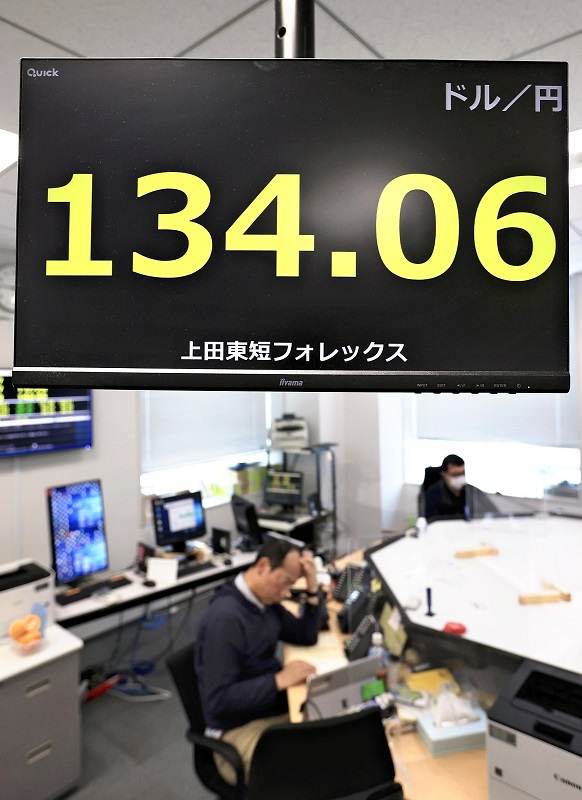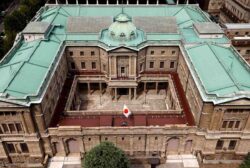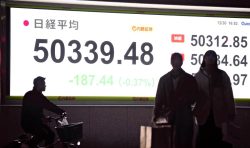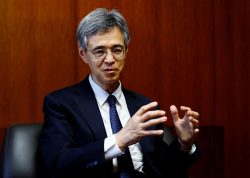
The yen-dollar exchange rate is shown on a board in Chuo Ward, Tokyo, on Friday.
10:41 JST, June 11, 2022
TOKYO (Reuters) — Japan’s government and central bank said on Friday they were concerned by recent sharp falls in the yen in a rare joint statement, the strongest warning to date that Tokyo could intervene to support the currency as it plumbs 20-year lows.
The statement underscores growing concern among policymakers over the damage that sharp yen depreciation could inflict on Japan’s fragile economy by hurting business activity and consumers.
But many market players doubt that G7 member Japan will step in soon to directly prop up the yen, a diplomatically fraught and potentially costly course of action that last occurred 20 years ago.
After a meeting with his Bank of Japan (BOJ) counterpart, top currency diplomat Masato Kanda told reporters that Tokyo will “respond flexibly with all options on the table.”
He declined to say whether Tokyo could negotiate with other countries to jointly step into the market.
The G7 has a long standing policy that markets ought to determine currency rates, but that the group will closely coordinate on currency moves, and that excessive and disorderly exchange-rate moves could hurt growth.
“We have seen sharp yen declines and are concerned about recent currency market moves,” the Ministry of Finance, BOJ and the Financial Services Agency said in the joint statement released after their executives’ meeting.
“We will communicate closely with each country’s currency authorities and respond appropriately as needed,” based on the G7 principles, the statement said.
Officials of the three institutions meet occasionally, usually to signal to markets their alarm over sharp market moves. But it is rare for them to issue a joint statement with explicit warnings over currency moves.
The statement came hours ahead of the release of the U.S. Treasury Department’s twice-annual currency manipulation report, which kept Japan on a list of 12 countries whose foreign exchange practices merit “close attention.” It took note of the recent yen weakness, which it attributed largely to interest rate differentials owing to the BOJ’s continued policy accommodation.
The yen briefly rallied to ¥133.37 per dollar after Tokyo’s statement, but retraced most of that after a stronger-than-expected reading of U.S. inflation signaled more aggressive rate increases ahead from the Federal Reserve, which are likely to further widen the rate differentials hanging over the yen. It was last at ¥134.15.
“Tokyo could intervene if the yen slides below ¥135 to the dollar and starts going into a free fall. That’s when Tokyo really needs to step in,” said Atsushi Takeda, chief economist at Itochu Economic Research Institute in Tokyo.
“But Washington won’t join so it will be solo intervention. For the United States, there’s really no merit in joining Tokyo on intervention.”
The yen’s sharp declines have inflated already rising raw material import costs, jacking up households’ living costs and putting pressure on the BOJ to address creeping inflation.
The BOJ and the U.S. Federal Reserve are both scheduled to hold policy meetings next week.
With the Japanese economy still much weaker than its peers, the BOJ is widely expected to maintain its ultra-easy policy next week. But it will face the dilemma of having to stick with low rates, even though it could fuel further yen declines.
“I don’t think today’s statement would have a direct impact on the BOJ’s policy meeting next week,” said Hiroshi Ugai, chief Japan economist at JPMorgan Securities. “There are limits to what the BOJ can do.”
Unlike other major central banks which are flagging aggressive interest rate hikes to tackle inflation, the BOJ has repeatedly committed to keeping rates low, making Japanese assets less attractive for investors.
That increasing policy divergence sent the yen down 15% against the dollar since early March and within striking distance of 135.20 hit on Jan. 31, 2002. A break past that would be its lowest since October 1998.
Underscoring growing public sensitivity to rising living costs, BOJ Governor Haruhiko Kuroda was forced to apologize on Tuesday for a remark a day earlier that households were becoming more accepting of price rises.
“What can potentially slow the pace of depreciation is a change in policy but right now it looks like there is no indication that the Bank of Japan is concerned about inflation or the impact of the weak yen on that,” said Moh Siong Sim, a currency strategist at Bank of Singapore.
“It [the joint statement] is more of a verbal intervention and I’m not sure whether it will amount to any action and won’t have any impact on the yen,” he said, adding the bar for actual intervention in foreign exchange markets remains very high.
Given the economy’s heavy reliance on exports, Japan has historically focused on arresting sharp rises in the yen and taken a hands-off approach on yen falls.
The last time Japan intervened to support its currency was in 1998, when the Asian financial crisis triggered a yen sell-off and a rapid capital outflow from the region. Before that, Tokyo intervened to counter yen falls in 1991-1992. Its last intervention of any kind was in 2011, but that was to weaken the yen.
The U.S. Treasury report, which had no reference to Friday’s statement from Tokyo, credited Japan for its transparency about its foreign exchange operations but cautioned that interventions should be rare events with ample advance notice.
“Treasury’s firm expectation is that in large, freely traded exchange markets, intervention should be reserved only for very exceptional circumstances with appropriate prior consultations,” the report said.
Top Articles in Business
-

Prudential Life Insurance Plans to Fully Compensate for Damages Caused by Fraudulent Actions Without Waiting for Third-Party Committee Review
-

Japan, U.S. Name 3 Inaugural Investment Projects; Reached Agreement After Considerable Difficulty
-

Japan’s Major Real Estate Firms Expanding Overseas Businesses to Secure Future Growth, Focusing on Europe, U.S., Asia
-

SoftBank Launches AI Service for Call Centers That Converts Harsh Customer Voices into Softer Voices
-

Green Tea Exports Hit Record High in 2025 Amid Growing Demand, Likely to Be Driving Force Behind Govt Export Target
JN ACCESS RANKING
-

Producer Behind Pop Group XG Arrested for Cocaine Possession
-

Japan PM Takaichi’s Cabinet Resigns en Masse
-

Man Infected with Measles Reportedly Dined at Restaurant in Tokyo Station
-

Israeli Ambassador to Japan Speaks about Japan’s Role in the Reconstruction of Gaza
-

Videos Plagiarized, Reposted with False Subtitles Claiming ‘Ryukyu Belongs to China’; Anti-China False Information Also Posted in Japan























